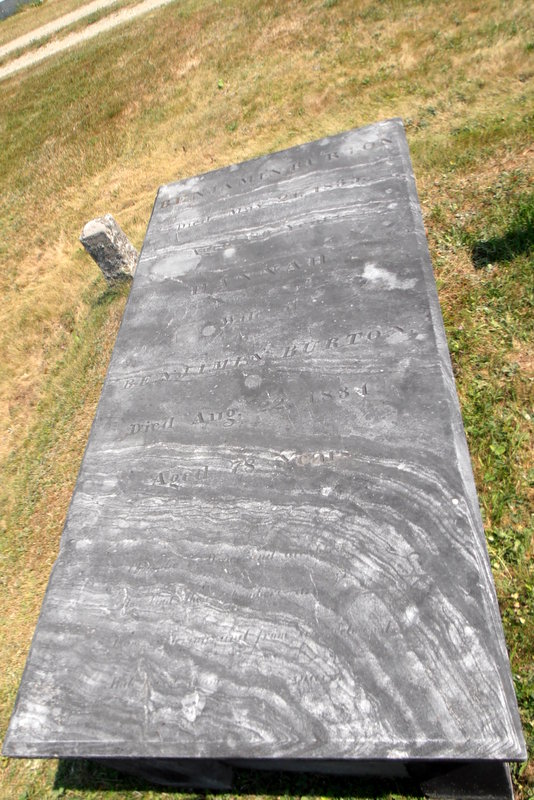The 9 October Augusta Age newspaper listed three men: Benjamin Simpson, Ephraim Smith, and “Col. Benjamin Barton of Warren.”
That third man was actually named Benjamin Burton. He was born 9 Dec 1749 in Thomaston and died 21 May 1835 in Warren, having lived much of his life in Cushing. The top of his marble sarcophagus appears here, courtesy of Find-a-Grave.
Burton rose to the rank of major during the Revolutionary War and also had an exciting time as a prisoner of war alongside Gen. Peleg Wadsworth. He later became a colonel in the militia, magistrate, and legislator.
Obviously by 1833 Burton was stating publicly that he had helped to destroy the tea in Boston harbor. In that same period he was also applying for a federal pension for his Revolutionary War service. His application file says nothing about the Tea Party, which wasn’t pertinent to whether he qualified.
Benjamin Carp’s Defiance of the Patriots cites a letter from Burton to Maine historian William D. Williamson in 1835 as a source. The book says Burton was a sailor on the Cumberland who happened to be in Boston on the crucial night and joined in destroying the tea. I haven’t seen that letter to know if it offers more detail to assess.
Thirty years later, in his History of Thomaston, Rockland, and South Thomaston, Maine, Cyrus Eaton relayed Burton’s claim to be at the Tea Party this way:
[Burton,] happening to be at Boston on a visit, went in the crowd to the Old South meetinghouse, and, as soon as the patriot orator had closed his animated address, hearing the shout tea-party, tea-party, and being touched with the spirit of the times, joined the party, was stationed in the hold of one of the ships to fasten the slings upon the tea-chests, and labored with his might between two and three hours in the work of destruction. It being about the time of low water, the detested tea rested on the ground and, when the tide rose, floated as a scum upon the water and was lodged by the surf along the shores.That account strikes me as unreliable. The term “tea party” wasn’t applied to the event until the 1820s.
Even farther afield, the website of the Tea Party Ships and Museum states that Burton “was also one of the men who led the meeting at the Old South Meeting House before the tea protest actually began.” None of the nineteenth-century sources makes such a claim. It’s possible that was based on a misreading the phrase about “the patriot orator” above as applying to Burton rather than Samuel Adams or another of the politicians who spoke that night.

No comments:
Post a Comment